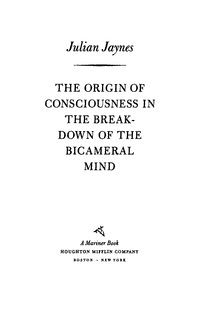
The Origin of Consciousness in the Breakdown of the Bicameral Mind PDF
Preview The Origin of Consciousness in the Breakdown of the Bicameral Mind
Front Matter Page: i Half Title Page: i Title Page: iii Copyright Page: iv Preface Page: v Contents Page: vii Introduction Page: 1 Book I The Mind of Man Page: 19 1. The Consciousness of Consciousness Page: 21 2. Consciousness Page: 48 3. The Mind of Iliad Page: 67 4. The Bicameral Mind Page: 84 5. The Double Brain Page: 100 6. The Origin of Civilization Page: 126 Book II The Witness of History Page: 147 1. Gods, Graves, and Idols Page: 149 2. Literate Bicameral Theocracies Page: 176 3. The Causes of Consciousness Page: 204 4. A Change of Mind in Mesopotamia Page: 223 5. The Intellectual Consciousness of Greece Page: 255 6. The Moral Consciousness of the Khabiru Page: 293 Book III Vestiges of the Bicameral Mind in the Modern World Page: 315 1. The Quest for Authorization Page: 317 2. Of Prophets and Possession Page: 339 3. Of Poetry and Music Page: 361 4. Hypnosis Page: 379 5. Schizophrenia Page: 404 6. The Auguries of Science Page: 433 AFTERWORD Page: 447 Back Matter Page: 471 Index Page: 471 The Drawings Page: 493 About the Author Page: 496 Back Cover Page: Back Cover Spine Page: Spine
Description: